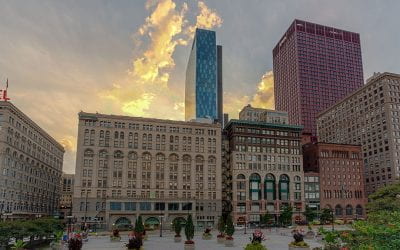A Legacy of Resistance
Student essayby Gigi Davis
(BA POLITICAL SCIENCE, ’14; MA HISTORY, ’18)
Why were peaceful student anti-war protestors attacked at the Democratic National Convention 50 years ago? It is with the goal of answering this question that I began my research for Roosevelt University’s History Department discussion panel.

Admittedly, I knew very little about the 1968 DNC despite being a native Chicagoan and having earned my bachelor’s in political science and master’s in history from Roosevelt. I vaguely remember watching a documentary about the chaos and violence that once erupted in the city, but begrudgingly admit that I was unaware of Roosevelt students actively demonstrating and protesting the Vietnam War. The active student body as a whole was impressively socially conscious.
In my last year of graduate studies at Roosevelt, I was offered a graduate assistantship in the History Department involving various tasks and assignments from my supervisor, Professor Margaret Rung. In one of our meetings, she said that the department was interested in commemorating the upcoming 50th anniversary of the ’68 DNC by hosting a panel discussion. My fellow graduate assistant Aaron Tyler and I were tasked with seeking alumni candidates for the discussion. Immediately, I knew I would be most interested in uncovering the student activism prevalent throughout the Sixties. I didn’t know at the time that I would be informed and inspired by the organizing and protest efforts by my fellow Roosevelt alumni.
Thankfully, Aaron and I didn’t have to depend on our own amateur historian skillsets to start this research assignment. We both received valuable advice and guidance from Professor Rung, as well as assistance from my absolute favorite historian, Professor Erik Gellman. After contacting Professor Gellman regarding this assignment and receiving names of potential candidates for the panel discussion, I was ready to start digging into Roosevelt’s past student activism and social climate.
I decided to review archives of The Torch and local newspaper articles about student protest in the late ’60s. I was specifically interested in articles published a couple of years before the DNC in an effort to capture the overall social climate and student reaction to U.S involvement in the war.
I spent an estimated week and a half poring over my source materials during my spare time between classes. I found several Torch articles, starting in October 1965 leading up to the DNC, that reported student organized protests and sit-ins. The Torch’s overall tone was surprisingly very militant and responsive to rising national contention over the war. I followed up on a Chicago Tribune article suggested by Professor Gellman and found that RU student demonstrators were arrested and charged with criminal trespass at a protest outside of the University. Eric Deutsch, Bruce Kresnoff and Kevin Mahoney were all Roosevelt students who joined their fellow classmates in an organized protest against a controversial University policy that surrendered student academic standings to the selective service system. In all, seven students and two members of the faculty were arrested during sit-ins organized to challenge the University’s position regarding student rights.
“It was RU student protestors, along with others from across the nation, whose fight for justice toiled the soils of oppression and inhumanity.”
– Gigi Davis
BA Political Science, ’14; MA History, ’18
This project has furthered my knowledge of Chicago’s politics in the 1960s, as well as sharpened my eye as a historian. The violence and political disorder that ensued during the later part of the decade in Chicago was symbolic of a nation that was socially and politically degenerating. When I consider the price of freedom that was paid by my fellow Roosevelt alumni, I appreciate more than ever my right to assemble. I believe I know now why Chicago has not bloomed or earned its right to claim itself as the “Garden City.” It is the very dirty and broken local government that has refused in the past, and still today, to reconcile its injustices. It was RU student protestors, along with others from across the nation, whose fight for justice toiled the soils of oppression and inhumanity. For that, I think we should all be thankful.
As a historian, I was pleased to discover that there were indeed many student-led protests and sit-ins captured by The Torch and national periodicals such as the Chicago Tribune. As a Roosevelt student, I am proud to carry the mantle of social activism and resistance created by those RU alumni who fiercely set the precedent for student social awareness. I am empowered by the student solidarity and determined resilience demonstrated by the student protesters. As a minority, I am thankful that those who came before me sought to remedy injustices and challenge the power structures that influence social and economic policies. Like everybody else, I am just a speck of star-stuff, a single human being who desperately believes that it is our collective fight against the worst things in this world that makes us whole.
1“POLICE ARREST 3 IN SIT-IN AT ROOSEVELT U.” Chicago Tribune (1963-Current file):
1. May 25 1966. ProQuest. Web. 6 Apr. 2018 .
More in this section
Taking the skybridge
Nathaniel Thomas lived his freshman year in the Wabash Building, which he describes as “a big, blue, beautiful skyscraper.”
In Memoriam | Fall 2022
Roosevelt University extends its deepest sympathy to the loved ones of recently deceased alumni and friends.


